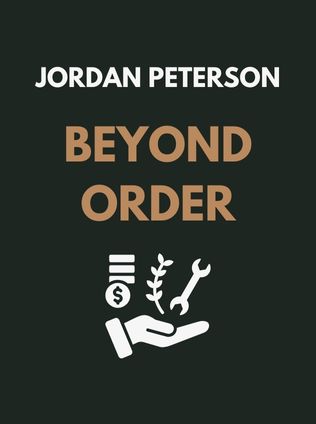
Beyond Order
12 More Rules For Life
By Jordan Peterson
Published 03/2021
About the Author
Jordan B. Peterson is a Canadian clinical psychologist and professor emeritus at the University of Toronto. With a background that includes a role as an associate professor at Harvard, Peterson rose to international prominence in 2016 due to his outspoken critique of identity politics, particularly concerning Canada's Bill C-16. This bill, which sought to extend protections against discrimination to gender-diverse individuals, became a focal point for Peterson's broader views on free speech and the dangers of political correctness.
Beyond his controversial public persona, Peterson is also known for his deep dives into topics such as mythology, religion, and psychology through his YouTube-based lectures. His first book, 12 Rules for Life, became a bestseller and solidified his status as a major figure in contemporary self-help literature. Beyond Order, his follow-up, builds on the foundation laid by his previous work, offering additional guidance on how to navigate the complexities of modern life.
Main Idea
Beyond Order is Jordan B. Peterson's exploration of how to maintain balance in a world teetering between chaos and order. While his earlier work emphasized the necessity of structure and discipline, Beyond Order delves into the equally crucial need to embrace the unpredictable and chaotic aspects of life. The book presents twelve additional rules that are intended to guide readers in creating a life that is not only structured and orderly but also dynamic and open to the possibilities of change.
Through these rules, Peterson addresses the importance of taking responsibility, committing to personal growth, and confronting the darker aspects of existence. He encourages readers to strike a balance between the security of order and the vitality of chaos, arguing that both are necessary for a fulfilling life.
Table of Contents
- Respect Both Tradition and Progressive Change
- Focus Intensely on Becoming All That You Can Be
- Don’t Blind Yourself to Chronic Stressors
- Take On the Burdens of Responsibility
- If You Loathe Something, Avoid It
- Reject Dogma
- Commit and Follow Through
- Make Space for Beauty in Your Life
- Process and Learn From Your Past
- Actively Work to Keep Your Marriage Alive
- Resist the Temptations of Frustrated Self-Absorption
- In the Face of Suffering, Find Thankfulness
Respect Both Tradition and Progressive Change
Peterson begins Beyond Order by acknowledging the tension between tradition and progressivism. He argues that while traditions provide us with a sense of stability and continuity, they can also become rigid and outdated. Conversely, progressive ideas can bring about necessary change but may also destabilize society if not balanced by a respect for tradition.
Peterson posits that our social institutions, which have developed over millennia, offer solutions to complex problems such as governance, social cohesion, and conflict resolution. However, these institutions can become dogmatic, clinging to outdated practices. Progressive thinkers challenge these norms, leading to societal evolution. Peterson stresses the importance of balancing these forces to avoid falling into extremes:
"If one is missing, we risk falling to either extreme: conservatism becomes stagnant and corrupt, unable to handle a changing world, while liberalism can lead to totalitarian ideologies that crucify offenders." – Jordan B. Peterson
This perspective reflects a Hegelian dialectic, where ideas evolve through conflict and resolution, leading to a synthesis that incorporates elements of both the original thesis and its antithesis. For example, the ongoing debates in politics, science, and culture can be seen as part of this dialectical process, where new ideas challenge old ones, leading to the continuous evolution of society.
Focus Intensely on Becoming All That You Can Be
In Rule 2, Peterson emphasizes the importance of personal growth and self-actualization. He argues that we live in a world of boundless potential, and it is our responsibility to cultivate that potential to the fullest. This rule is rooted in the belief that we each have a moral obligation to become the best version of ourselves, not just for our own sake, but to contribute positively to society.
Peterson suggests that one way to achieve this is by looking to the great stories and myths of the past, particularly the hero's journey. These stories, which have been passed down through generations, encapsulate the archetypal patterns of behavior that have been deemed "right" and "wrong" by societies throughout history. The hero's journey, in particular, serves as a metaphor for personal growth and transformation:
Sign up for FREE and get access to 1,400+ books summaries.
You May Also Like
The Subtle Art of Not Giving a F*ck
A Counterintuitive Approach to Living a Good Life
By Mark MansonRich Dad Poor Dad
What the Rich Teach Their Kids About Money - That the Poor and Middle Class Do Not!
By Robert T. KiyosakiHow To Win Friends and Influence People
The All-Time Classic Manual Of People Skills
By Dale CarnegieFreakonomics
A Rogue Economist Explores the Hidden Side of Everything
By Steven D. Levitt and Stephen J. Dubner



















